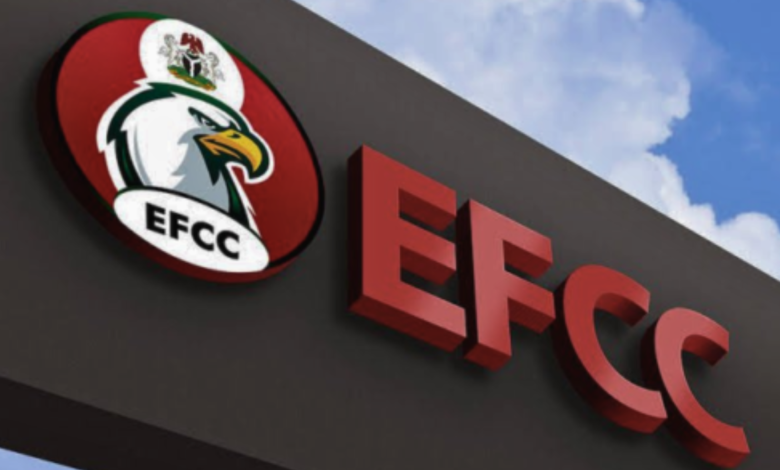Explainer: Understanding Fund Allocation & Remittance; EFCC and the Alleged ₦50 Billion Donation to NELFUND

BY: Mustapha Lawal
In recent media reports, claims have emerged that the Economic and Financial Crimes Commission (EFCC) made a substantial donation of ₦50 billion to the Nigerian Education Loan Fund (NELFUND), allegedly sourced from proceeds of crime. This claim, if true, would mark a significant financial intervention by the EFCC into the educational sector. These claims, which have stirred public interest, originated after Akunwunmi Sawyerr, head of NELFUND, reportedly credited the EFCC for a ₦50 billion donation during a meeting in Abuja.

Photo Credit: Screenshot of Some of the Media Reports ||
According to one such report, Sawyerr thanked the Ola Olukoyede-led EFCC for the donation and invited the agency to regulate their use of the funds. The source of these reports was a statement the EFCC published on Tuesday after the meeting.
The Truth Behind the Claim: EFCC’s Role in Fund Remittance
The EFCC did not donate ₦50 billion to NELFUND. Contrary to these reports, the EFCC’s role is strictly to remit recovered proceeds of crime into the Federation Account, with no authority to allocate these funds directly.
The role of the EFCC, as explained by its spokesman, Dele Oyewale, was to remit recovered proceeds of crime into the federation account, following the constitutional mandate. The decision to allocate ₦50 billion to NELFUND was made by President Bola Tinubu, not by the EFCC.
“Mr Dele Oyewale stated, ‘The funds were deposited into the Federation Account as required by law, and it was the President who directed the allocation of ₦50 billion to NELFUND.’” reported the Foundation for Investigative Journalism (FIJ).
This directive, as Oyewale described, was contained in President Bola Tinubu’s August 4 address to the nation. According to the president in his address: “This week, I ordered the release of an additional N50billion each for NELFUND – the student loan, and Credit Corporation from the proceeds of crime recovered by the EFCC.”
Also, recall that in December 2023, the Ministry of Finance ordered all ministries, departments and agencies to remit 100% of their internally generated revenue (IGR) to the Sub-Recurrent Account, a sub-component of the Consolidated Revenue Fund (CRF). The EFCC would have run foul of this directive if it had done with the funds any other thing than remit it into the federation account.
Constitutional Guidelines: Section 162 and Fund Allocation in Nigeria
According to the Nigerian Constitution, specifically Section 162, all revenue generated by the Federation, including proceeds of crime recovered by the EFCC, must be paid into the Consolidated Revenue Fund (CRF). This fund serves as the central treasury for all governmental finances. The EFCC, as a statutory body, must adhere to this mandate, with no direct involvement in fund allocation, which is exclusively the President’s prerogative.
Section 162 of the Constitution of the Federal Republic of Nigeria states:
- The Federation shall maintain a special account to be called “the Federation Account” into which shall be paid all revenues collected by the Government of the Federation, except the proceeds from the personal income tax of the personnel of the armed forces of the Federation, the Nigeria Police Force, the Ministry or department of government charged with responsibility for Foreign Affairs and the residents of the Federal Capital Territory, Abuja.
- The President, upon the receipt of advice from the Revenue Mobilisation Allocation and Fiscal Commission, shall table before the National Assembly proposals for revenue allocation from the Federation Account, and in determining the formula, the National Assembly shall take into account, the allocation principles especially those of population, equality of States, internal revenue generation, land mass, terrain as well as population density; Provided that the principle of derivation shall be constantly reflected in any approved formula as being not less than thirteen per cent of the revenue accruing to the Federation Account directly from any natural resources…
Read more about the section here: https://jurist.ng/constitution/sec-162
This section of the Constitution empowers the President, in consultation with the National Assembly, to determine how funds from the CRF are allocated. In this case, the President directed that ₦50 billion be allocated to NELFUND and another ₦50 billion to the Consumer Credit Corporation from these recovered funds.
This directive is in full compliance with Nigeria’s constitutional provisions, which strictly delineate the roles of agencies like the EFCC in the management of recovered funds, thus ensuring transparency and adherence to the rule of law. By law, the EFCC’s role ends once it deposits recovered funds into the federation account. The allocation and usage of these funds are determined by the executive branch of the government, under the oversight of the National Assembly.
Implications of Misinformation: Clarifying EFCC’s Responsibilities
The reports suggesting that the EFCC directly donated the funds to NELFUND are false and reflect a misunderstanding of the agency’s role. The EFCC operates within a legal framework that dictates the management of recovered funds. The decision-making power concerning the allocation of these funds lies with the President, as per constitutional provisions.
Such misinterpretations could erode public trust in governmental institutions, highlighting the need for accurate and informed reporting to prevent the spread of misinformation and confusion regarding the functions of key government agencies. It also highlights the need for accurate reporting to prevent public misinformation.
Conclusion:
The claim that the EFCC donated ₦50 billion to NELFUND is false. The funds in question were sourced from proceeds of crime recovered by the EFCC, but the allocation of these funds to NELFUND was a presidential directive, in line with constitutional provisions. Understanding this distinction is not only crucial for lawful fund management but also for maintaining the integrity of Nigeria’s governance structures. Ensuring that the public is accurately informed about the roles of different government agencies is key to fostering transparency and accountability in the administration of public resources. This case highlights the need for media outlets to verify claims rigorously before publication




